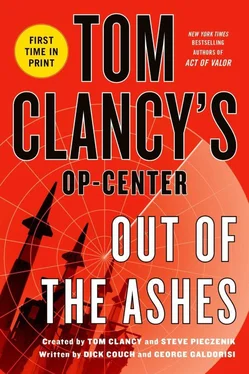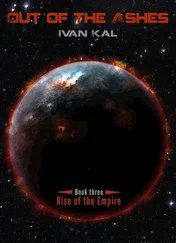“They did, Mr. President. I understand that you have some of the story in that regard. I may ask to brief you again in person, assuming we get any significant additional information.”
“Thank you, Chase.”
“Anything else I can help you with at the moment, Mr. President? I know General Albin’s got a big task ahead clearing those mines in the Strait of Hormuz.”
“No, thank you. I think we’re good for now. I’m told the mine-clearing operations should be fairly straightforward. Iran has even reached out to us via the Swiss and is telling us rogue Revolutionary Guard Corps Navy elements dumped those mines in the water.”
“You don’t believe that, do you, Mr. President? Our communications people have compelling evidence this is not the case.”
“No, Chase, I don’t believe that for a minute, but the fact they’re apologizing is a good thing. With the Iranians you never know, but maybe this will allow us to begin a broader dialogue. They even volunteered to send their navy to retrieve the mines, but we turned them down. They don’t have the capability or the capacity to clear mines quickly. I want our Navy ships to be able to move freely in and out of the Gulf. I don’t like having a carrier strike group trapped in there. It’s good for the Iranians and the world to see us do this.”
“I understand, Mr. President. I’ll let you know when I have more information for you.”
* * *
The two MH-60M helos streaked low and fast across the desert. There was no time to waste leaving Saudi territory and Saudi airspace as it was unknown how long it would take the Saudi military air traffic control system to get back up and running after Aaron Bleich and his team had taken it down.
Volner conferenced with his two Arabic speakers and they pieced together much of al-Wandi’s plan. This information, along with the ramblings of Jawad Makhdoom and the Northrup Grumman engineer, were passed by secure comm link to Op-Center. All this made it quickly up the chain and diplomatic fences between the United States and Saudi Arabia were already in the process of being mended.
* * *
It was several hours before dawn and Joe Armao’s forces were reviewing their hunting and clearing plans. Armao had asked the 5th Fleet commander for an escort ship to accompany his scantily armed mine-countermeasures force as they moved into the Strait of Hormuz and close to Iranian waters. Mustin was detached from the main body of the fleet in the northern Gulf to accompany them. At that moment, the Arleigh Burke —class destroyer was streaking south at thirty knots from her position to join the MCM flotilla.
* * *
Ilya Gorbonov was in a foul mood. He was getting weary of living in a hotel, and he hated Washington and especially the D.C. traffic. He needed to visit his costume jewelry carts, however, from time to time so when he made his final delivery of sarin gas to each cart, disguised as a box of costume jewelry, the salespeople he had hired to manage the carts would be accustomed to him coming by.
He had been to his carts at Union Station, the Pentagon City Mall, the Crystal City Underground, and White Flint Mall, and now he trudged up to his cart in Tysons Corner’s large food court. “Hello, Allison.”
“Hello, Mr. Wilson,” she replied, using the name Gorbonov had selected for his new identity.
“So how is business today?”
“Good, Mr. Wilson. It’s spring break, so this place is swarming with high school kids and with visitors from out of town. This stuff is cheap enough that it sells pretty well.”
“That’s good, Allison, and how are your night classes at George Mason going?”
“Oh, they’re going OK; thanks for asking. I’ll have my associate’s degree by the end of June and then go on for my bachelor’s degree.”
“Well, keep up the good work, Allison. And remember, no matter how many degrees you have, life is all about selling. What you’re learning here will stand you in good stead even after you have your PhD.”
As Gorbonov trudged away, Allison reflected on what a nice man he was.
Gorbonov, now known as Mr. Wilson to all his young employees, knew some of these young people would die horribly. Exactly who died would depend on who was working at the time the explosive device he would rig to the canister of sarin gas he delivered to each cart went off. It troubled him little.
Niavaran Palace, Tehran, Iran
(March 23, 0830 Arabia Standard Time)
Grand Ayatollah Seyyed Ali Hosseini Khamenei had summoned Iran’s president, Sarosh Madani, to the Niavaran Palace shortly after morning prayers. There was a great deal they needed to talk about.
“Grand Ayatollah, good morning, and may Allah’s blessings be on you.”
“And with you also, President Madani. Please, sit. There is much we need to discuss.”
Sarosh Madani was on guard, as he always was in the grand ayatollah’s presence. Now in his second year as Iran’s elected president, Madani was already wearying of being a mere puppet to Khamenei. He was a veteran Iranian politician, and had anticipated the grand ayatollah’s meddling in everything he did. Yet, somehow he hadn’t thought it would be this bad.
“This has been a great victory for our nation, President Madani, don’t you think so?” Khamenei asked. “We have honored our pledge to Hafez Shaaban and the Americans have not attacked Syria. Our ally is now secure and will continue to help us achieve our long-term goals in the region.”
If those long-term goals include remaining an international pariah and having Iran’s citizens continue to suffer because of Western economic sanctions, then your goals are being more than met, Grand Ayatollah . Madani thought all this, but dared not say it.
“Yes, Grand Ayatollah, that is certainly a good thing.”
“Now the Americans are going to meekly sweep the mines our Islamic Revolutionary Guard Corps Navy forces sowed near the Strait of Hormuz. I think the West now has the message not to trifle with us.”
This mining fiasco had enraged Madani. He was not even consulted before Khamenei had ordered Revolutionary Guard Corps Navy forces to mine the Strait of Hormuz and had browbeat Admiral Sayyari to have Iranian navy corvettes escort the mine-laying dhows. This alone destroyed any chance of the Iranian regime having plausible deniability. And then saying that the Revolutionary Guards had done this on their own. What was behind that? Was Khamenei that stupid he thought the Americans would believe that?
“Grand Ayatollah, yes, I think you, we, have more than made a statement to the United States and the West. Once the Americans finish sweeping these mines we will have accomplished what we set out to do, and then we, too, will be able to ship our oil to market.” Madani couldn’t help but glance around Niavaran Palace where Khamenei continued live in near-Western luxury no matter how much or how little of Iran’s oil made it through the strait.
“President Madani. I know you have been in office only a short time, so I must remind you this is also a matter of ensuring the West, and especially the Americans, respect the Islamic Republic of Iran and the great Persian nation. Anything less is unacceptable.”
“Yes, I understand that, Grand Ayatollah.”
“Then you also understand that we sometimes must insist on that respect and take action if it is not given. We must also demand the West respect our right to develop nuclear capabilities. Yet the West, led by the Americans, has put economic sanctions in place and has tried to make us yield by crushing our economy, but they have failed.”
Читать дальше












